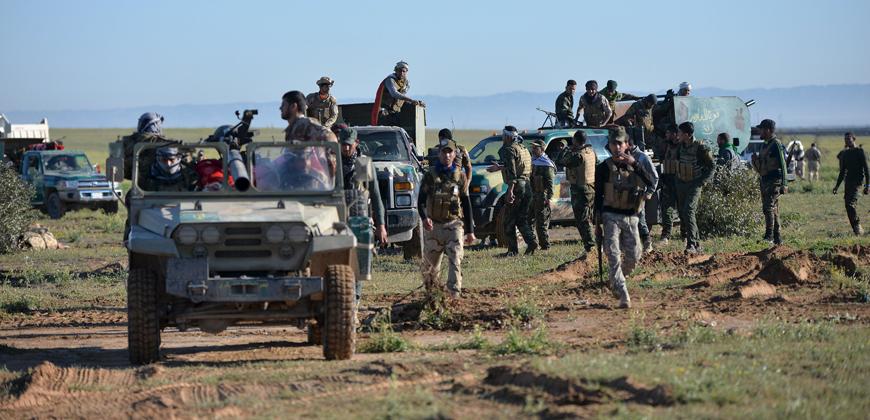You are here
Kurds report more chlorine attacks; Iraq pauses Tikrit offensive
By Reuters - Mar 16,2015 - Last updated at Mar 16,2015
ERBIL/BAGHDAD — Iraq said on Monday it had put its Tikrit offensive on hold and senior officials called for more air strikes to dislodge Daesh militants, while a Kurdish officer said his forces were exposed to two further chlorine gas attacks by the insurgents.
General Aziz Waisi told journalists the insurgents used chlorine in a December attack on his military police brigade in the Sinjar mountain area, and twice during a January offensive west of Mosul, including a January 23 attack described by Kurdish authorities on Saturday.
Waisi said a number of military police — he did not say how many — were taken to hospital, where blood tests indicated they had inhaled chlorine gas released by the bombs.
"When it exploded we realised it was not a normal smoke because it caused unconsciousness and vomiting," he said, describing one incident, when peshmerga blew up a vehicle driven by a suspected would-be suicide bomber.
He declined to say whether samples from the two previously unreported attacks had been tested at an international laboratory along with those from the January 23 attack.
The Dutch-based Organisation for the Prohibition of Chemical Weapons said over the weekend it had not had a request from Iraq to investigate claims of chemical weapons use and said the group could not immediately verify the claims.
Iraq's Kurds were the victims of the deadliest chemical attack of modern times when Saddam Hussein's air force bombed the town of Halabja in 1988, killing at least 5,000 people.
Tikrit pause
In Tikrit, military officials said there was no fighting on Monday. Daesh insurgents who control large parts of north and west Iraq and territory in neighbouring Syria have managed to hold onto central districts of Saddam's home city and have laid explosives to hold up the advancing forces.
The offensive by Iraqi security forces and mainly Shiite militia is their largest yet against Daesh, but the campaign stalled on Friday after they pushed into Tikrit last week.
Government forces are in control of most of the northern Qadisiya district as well as the southern and western outskirts of the city, trapping the militants in an area bounded by the river that runs along Tikrit's eastern edge.
"We need air support from any force that can work with us against IS [Daesh]," Deputy Minister of Defence Ibrahim Al Lami told Reuters, declining to say whether he meant from the US-led coalition or Iran, which is playing a role in the assault.
The US-led coalition, which has launched air strikes on Daesh positions in Iraq and Syria since last August, has been conspicuously absent from the offensive.
Powerful militia commander Hadi Al Amiri, head of the Shiite paramilitary Badr Organisation, said earlier in the offensive that militia victories before the Tikrit battle had been won without coalition air support.
Interior Minister Mohammed Al Ghaban said authorities had put a temporary halt to the offensive in Tikrit, capital of the mainly Sunni Muslim Salahuddin province.
“We have decided to halt military operations in Salahuddin in order to reduce casualties among our heroic forces... and to preserve the remaining infrastructure,” he said at a news conference in the city of Samarra, 95 kilometres north of Baghdad.
“The situation is under control and we will choose the appropriate time to attack the enemy and liberate the area”.
Kurdish advance
More than 20,000 troops and Iranian-backed Shiite militia are taking part in the operation, which began two weeks ago, supported by a relatively small contingent of Sunni fighters from Tikrit and the surrounding Salahuddin province.
The assault is seen as a litmus test for plans to retake the large northern city of Mosul, which is likely to be a far more complex operation.
Meanwhile, coalition air strikes helped Kurdish forces seize the villages of Wahda, Saada, and Khalid from Daesh in the north — part of a broader week-long offensive to drive the militants away from the oil-rich city of Kirkuk.
Shiite Turkmen fighters also clashed for a fourth day with Daesh insurgents near the village of Bashir, south of Kirkuk.
In Baghdad, US presidential envoy General John Allen addressed a meeting of Iraqi and foreign officials aimed at kicking off efforts to stabilise and rebuild territories retaken from Daesh.
The militants have been driven back by Kurdish peshmerga forces in the north, and Shiite militia known as Hashid Shaabi (Popular Mobilisation) in the eastern province of Diyala, the Baghdad belt and north of the capital.
Allen said Iraqis were beginning to recover from life under Daesh in Diyala and “hopefully soon” in Tikrit, but that local governance would prove difficult because many officials had been killed, were in exile, or co-operated with Daesh.
Iraqi Prime Minister Haider Al Abadi’s spokesman Rafid Al Jaboori echoed calls for more air strikes: “We have been saying we need more air support for all operations,” he told Reuters. “We welcome air support for all our campaigns against Daesh”.
Related Articles
Daesh militants have set fire to oil wells northeast of the city of Tikrit to obstruct an assault by Shiite militiamen and Iraqi soldiers trying to drive them from the Sunni Muslim city and surrounding towns, a witness said.
Iraqi security forces and militias fought their way into Saddam Hussein's home city of Tikrit on Wednesday, advancing from the north and south in their biggest counter-offensive so far against Daesh militants.
BAGHDAD - Iraqi security forces and Shiite militia began an operation on Tuesday to dislodge Daesh militants from desert areas northwest of












